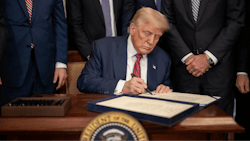Trump executive order directs ASPR to secure stockpiles of critical drug APIs
President Donald Trump on Wednesday signed an executive order directing the Office of the Assistant Secretary for Preparedness and Response (ASPR) to identify approximately 26 drugs critical to U.S. health and security, secure a six-month supply of active pharmaceutical ingredients for the drugs, and prioritize domestic sourcing where possible.
“When it comes to Active Pharmaceutical Ingredients (APIs), the biologically active components of finished drug products, only about 10% of the APIs by volume for the finished drug products used in the United States are made here,” Trump wrote in the order, adding that the Strategic API Reserve (SAPIR) created during his first administration is nearly empty.
Under the order, ASPR has 30 days to come up with a list of approximately 26 critical drugs for which SAPIR should stockpile APIs and then procure a six-month supply of those APIs “with a preference for obtaining domestically manufactured APIs if possible.”
The order also directs ASPR to update and secure stockpiles for its list of 86 essential medicines, along with a plan to obtain from domestic manufacturers — where possible — and store and maintain a six-month supply of APIs for drugs on the updated list.
Phlow Corporation in a Thursday press release applauded Trump’s executive order to operationalize SAPIR, a framework the company said it originated and proposed in 2020 with Trump’s first administration.
“Phlow’s original vision for SAPIR was built on the belief that supply chain resilience requires more than stockpiling,” the company said in a statement. “It demands an active, ready-to-deploy domestic infrastructure that can respond to dynamic threats, from pandemics to geopolitical tensions, by ensuring a continuous domestic supply of essential medicines.”
Leerink Partners analyst Puneet Souda in a Wednesday note to investors pointed out that the majority of the 86 “essential medicines” on the list are “low-cost, high-volume, small molecule drugs” such as amoxicillin, acetaminophen, and antibiotics. Manufacturing APIs for these drugs in the U.S. would likely increase the cost/pill due to higher labor, energy, and compliance costs, according to Souda.
“What remains unclear is whether the administration is willing to pay much higher prices for stockpiling API and generics manufactured in the U.S. when cheaper alternatives are available [outside U.S.]?” Souda wrote. “Further, the environmental impact of manufacturing API in the U.S. is also unclear. Recall that majority of chemical manufacturing at scale and API is done in China, with generic drugs made in India.”
While the order “could be an incremental positive” for Waters Corporation and Agilent Technologies given their analytical/liquid chromatography positions in generics and API, Souda said it is difficult to assess the broader impact for the industry until ASPR picks the list of approximately 26 critical drugs and there is “further clarity on incentives/funding of reconciling the cost differential of domestic production for small-molecule generics and API.”
Near the end of his first administration, Trump signed an executive order in August 2020 directing the FDA to create a list of essential medicines to help prioritize domestic production and reduce dependence on foreign suppliers of those products.
In Wednesday’s executive order, Trump said ASPR later reduced the list to 86 essential medicines and he also blamed the Biden administration for failing to “advance the goal of ensuring domestic sources for essential medicines and their precursors despite spending billions of dollars on efforts to secure supply chains.”
However, in a July 28 analysis, Brookings Institution senior fellow Marta Wosińska and senior research assistant Yihan Shi looked at China’s share of API production for U.S.-bound drugs and found that the “current aggregate exposure for complete API across all categories is much less than many reports suggest, likely a quarter of the U.S. drug volume, as measured in units.”
At the same time, they concluded that where China plays a critical role is in auxiliary chemicals, such as the production of reagents and solvents.
“These chemicals are necessary for the chemical synthesis of API and intermediates yet are omitted from virtually all analyses,” Wosińska and Shi wrote. “Auxiliary chemicals should be included in vulnerability assessments for essential medicines and considered in any stockpiling programs of precursors.”
About the Author
Greg Slabodkin
Editor in Chief
As Editor in Chief, Greg oversees all aspects of planning, managing and producing the content for Pharma Manufacturing’s print magazines, website, digital products, and in-person events, as well as the daily operations of its editorial team.
For more than 20 years, Greg has covered the healthcare, life sciences, and medical device industries for several trade publications. He is the recipient of a Post-Newsweek Business Information Editorial Excellence Award for his news reporting and a Gold Award for Best Case Study from the American Society of Healthcare Publication Editors. In addition, Greg is a Healthcare Fellow from the Society for Advancing Business Editing and Writing.
When not covering the pharma manufacturing industry, he is an avid Buffalo Bills football fan, likes to kayak and plays guitar.
